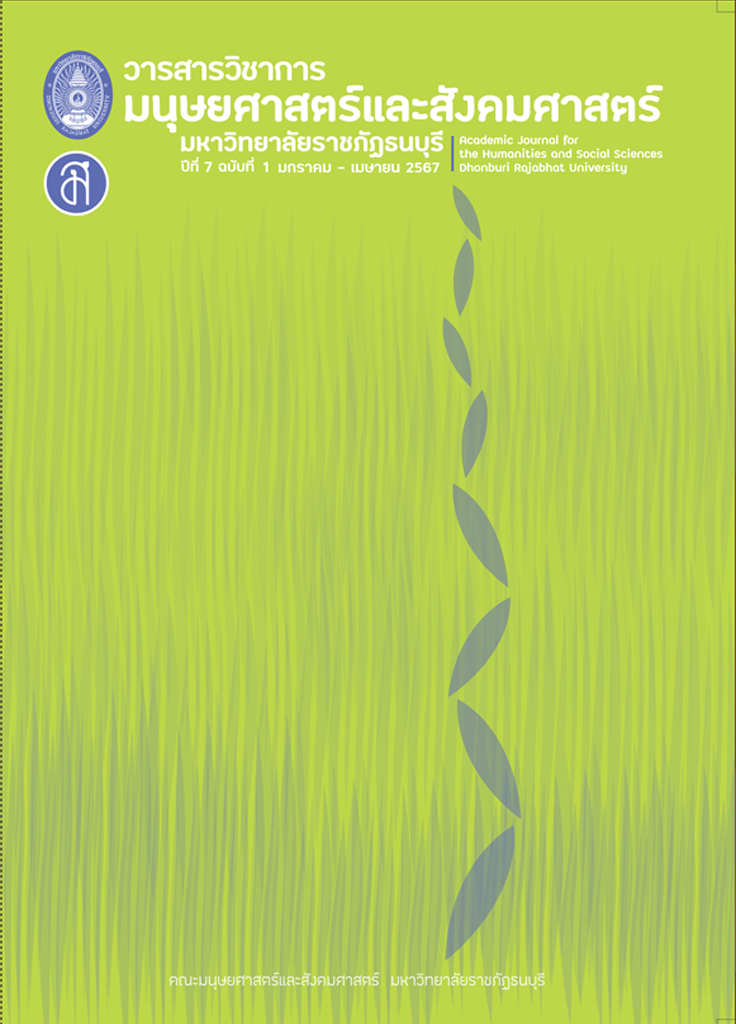การสานพลังความร่วมมือภาครัฐ ภาคเอกชน และภาคประชาสังคมในการขับเคลื่อนนโยบายเมืองอัจฉริยะ
คำสำคัญ:
การสานพลัง, ความร่วมมือ, นโยบาย, เมืองอัจฉริยะบทคัดย่อ
บทความนี้มีวัตถุประสงค์เพื่อศึกษาบทบาทและความสำคัญของการมีส่วนร่วมจากภาครัฐ ภาคเอกชน และภาคประชาสังคมในการผลักดันนโยบายเมืองอัจฉริยะ นำเสนอแนวทางการบูรณาการความร่วมมือระหว่างทุกภาคส่วนเพื่อผลักดันให้เป็นเมืองอัจฉริยะอย่างเป็นรูปธรรม ตลอดจนให้ข้อเสนอแนะเพื่อเพิ่มประสิทธิภาพในการขับเคลื่อนนโยบาย ฯ ดังกล่าว การขับเคลื่อนนโยบายเมืองอัจฉริยะให้ประสบความสำเร็จนั้นจำเป็นต้องอาศัยความร่วมมือจากทุกภาคส่วน ได้แก่ ภาครัฐ ภาคเอกชน และภาคประชาสังคม โดยภาครัฐมีบทบาทสำคัญในการกำหนดนโยบายและกรอบการดำเนินงานที่ชัดเจน จัดสรรงบประมาณและสนับสนุนโครงสร้างพื้นฐานที่จำเป็น ในขณะที่ภาคเอกชนสามารถนำเสนอนวัตกรรมและเทคโนโลยีใหม่ ๆ เพื่อเพิ่มประสิทธิภาพในการบริหารจัดการเมือง ส่วนภาคประชาสังคมจะทำหน้าที่เป็นสื่อกลางในการรับฟังความคิดเห็นและความต้องการของประชาชน เพื่อให้การพัฒนาเมืองอัจฉริยะสามารถตอบสนองต่อความต้องการที่แท้จริงของประชาชน ดังนั้น การสานพลังความร่วมมือระหว่างภาครัฐ ภาคเอกชน และภาคประชาสังคมจึงเป็นกุญแจสำคัญที่จะนำไปสู่ความสำเร็จในการพัฒนาเมืองอัจฉริยะอย่างยั่งยืนและเป็นประโยชน์ต่อประชาชนอย่างแท้จริง
เอกสารอ้างอิง
กรุงเทพธุรกิจ. (2565, ธันวาคม 20). ปั้นเมืองต้นแบบ ‘นนทบุรี’ ยกระดับศักยภาพการศึกษา-คุณภาพชีวิต. กรุงเทพธุรกิจ. สืบค้นจาก https://www.bangkokbiznews.com/health/education/1043859
กรุงเทพมหานคร. (2563). Smart City Handbook: Bangkok–Interview Questions. กรุงเทพฯ: สำนักยุทธศาสตร์และประเมินผล กรุงเทพมหานคร.
ฐานเศรษฐกิจ. (2566, พฤศจิกายน 20). AIS ชี้สร้าง “สมาร์ทซิตี้” ให้สำเร็จต้องตอบโจทย์ความต้องการประชาชน. ฐานเศรษฐกิจ. สืบค้นจาก https://www.thansettakij.com/technology/technology/581396
ประชาชาติธุรกิจ. (2564, เมษายน 5). “กรุงไทย” นำเทคโนโลยีทางการเงินปั้น “ฉะเชิงเทรา” เป็น Smart City. ประชาชาติธุรกิจออนไลน์. สืบค้นจาก https://www.prachachat.net/finance/news-642825
สถาบันพระปกเกล้า. (2563). รายงานสถานการณ์ การกระจายอำนาจ ประจำปี พ.ศ. 2562: บทสำรวจการพัฒนาเมืองอัจฉริยะขององค์กรปกครองส่วนท้องถิ่น. กรุงเทพฯ: สถาบันพระปกเกล้า.
สำนักงานส่งเสริมเศรษฐกิจดิจิทัล. (2564). การส่งเสริมเมืองอัจฉริยะ. สืบค้นจาก https://www.depa.or.th/th/smart-city-plan/smart-city-office
Albino, V., Berardi, U., & Dangelico, R.M. (2015). Smart cities: Definitions, dimensions, performance, and initiatives. Journal of Urban Technology, 22(1), pp. 3-21.
Angelidou, M. (2014). Smart city policies: A spatial approach. Cities, 41, pp. S3-S11.
Anthopoulos, L. (2015). Defining smart city architecture for sustainability. In Proceedings of 14th Electronic Government and 7th Electronic Participation Conference (IFIP2015). (pp. 140–147). IOS Press.
Anthopoulos, L., & Fitsilis, P. (2010). From Digital to Ubiquitous Cities: Defining a Common Architecture for Urban Development. In Proceedings of the 2010 Sixth International Conference on Intelligent Environments. (pp. 301-306). IEEE.
Batty, M., Axhausen, K. W., Giannotti, F., Pozdnoukhov, A., Bazzani, A., Wachowicz, M., Ouzounis, G. & Portugali, Y. (2012). Smart cities of the future. The European Physical Journal Special Topics, 214(1), pp. 481-518.
Bouzguenda, I., Alalouch, C., & Fava, N. (2019). Towards smart sustainable cities: A review of the role digital citizen participation could play in advancing social sustainability. Sustainable Cities and Society, 50, pp. 1-15.
Caragliu, A., & Del Bo, C.F. (2019). Smart innovative cities: The impact of Smart City policies on urban innovation. Technological Forecasting and Social Change, 142, pp. 373-383.
Caragliu, A., Del Bo, C., & Nijkamp, P. (2011). Smart cities in Europe. Journal of Urban Technology, 18(2), pp. 65-82.
Cardullo, P., & Kitchin, R. (2019). Being a 'citizen' in the smart city: Up and down the scaffold of smart citizen participation in Dublin, Ireland. GeoJournal, 84, pp. 1-13.
Chourabi, H., Nam, T., Walker, S., Gil-Garcia, J.R., Mellouli, S., Nahon, K., Pardo, T.A., & Scholl, H.J. (2012). Understanding smart cities: An integrative framework. In Proceedings of the 45th Annual Hawaii International Conference on System Sciences. (pp. 2289-2297). IEEE.
Deakin, M., & Al Waer, H. (2011). From intelligent to smart cities. Intelligent Buildings International, 3(3), pp. 133-139.
Emerson, K., Nabatchi, T., & Balogh, S. (2012). An integrative framework for collaborative governance. Journal of Public Administration Research and Theory, 22(1), pp. 1-29.
Hollands, R.G. (2008). Will the real smart city please stand up? Intelligent, progressive or entrepreneurial?. City, 12(3), pp. 303-320.
Lara, A.P., Moreira da Costa, E., Furlani, T.Z., & Yigitcanlar, T. (2016). Smartness that matters: Towards a comprehensive and human-centred characterisation of smart cities. Journal of Open Innovation: Technology, Market, and Complexity, 2(2), pp. 1-13.
Lee, J.H., Hancock, M.G., & Hu, M.C. (2014). Towards an effective framework for building smart cities: Lessons from Seoul and San Francisco. Technological Forecasting and Social Change, 89, pp. 80-99.
Lombardi, P., Giordano, S., Farouh, H., & Yousef, W. (2012). Modelling the smart city performance. Innovation: The European Journal of Social Science Research, 25(2), pp. 137-149.
Meijer, A., & Bolívar, M.P.R. (2016). Governing the smart city: a review of the literature on smart urban governance. International Review of Administrative Sciences, 82(2), pp. 392-408.
Mora, L., Deakin, M., & Reid, A. (2019). Strategic principles for smart city development: A multiple case study analysis of European best practices. Technological Forecasting and Social Change, 142, pp. 70-97.
Nam, T., & Pardo, T.A. (2011). Conceptualizing smart city with dimensions of technology, people, and institutions. In Proceedings of the 12th Annual International Digital Government Research Conference: Digital Government Innovation in Challenging Times. (pp. 282-291). ACM.
Pereira, G.V., Parycek, P., Falco, E., & Kleinhans, R. (2018). Smart governance in the context of smart cities: A literature review. Information Polity, 23(2), pp. 143-162.
Trencher, G., & Karvonen, A. (2019). Stretching “smart”: advancing health and well-being through the smart city agenda. Local Environment, 24(7), pp. 610-627.
Wang, K., Zhao, Y., Gangadhari, R.K., & Li, Z. (2021). Analyzing the Adoption Challenges of the Internet of Things (IoT) and Artificial Intelligence (AI) for Smart Cities in China. Sustainability, 13(19), pp. 1-35.
Yigitcanlar, T., Kamruzzaman, M., Buys, L., Ioppolo, G., Sabatini-Marques, J., da Costa, E.M. & Yun, J.J. (2018). Understanding ‘smart cities’: Intertwining development drivers with desired outcomes in a multidimensional framework. Cities, 81, pp. 145-160.
ดาวน์โหลด
เผยแพร่แล้ว
รูปแบบการอ้างอิง
ฉบับ
ประเภทบทความ
สัญญาอนุญาต
ลิขสิทธิ์ (c) 2024 มหาวิทยาลัยราชภัฏธนบุรี

อนุญาตภายใต้เงื่อนไข Creative Commons Attribution-NonCommercial-NoDerivatives 4.0 International License.
บทความที่ได้รับการตีพิมพ์เป็นลิขสิทธิ์ของ คณะมนุษยศาสตร์และสังคมศาสตร์ มหาวิทยาลัยราชภัฏธนบุรี
- บทความในวารสารวิชาการมนุษย์และสังคมศาสตร์ มหาวิทยาลัยราชภัฏธนบุรี เป็นความคิดเห็นของผู้นิพนธ์ ไม่ใช่ความคิดเห็นของกองบรรณาธิการ และไม่ใช่ความรับผิดชอบของกองบรรณาธิการและ/หรือของคณะมนุษยศาสตร์และสังคมศาสตร์ มหาวิทยาลัยราชภัฏธนบุรี
- กองบรรณาธิการไม่สงวนสิทธิ์ในการคัดลอก แต่ให้อ้างอิงแสดงที่มา
- บทความที่ได้รับตีพิมพ์จะมีการตรวจความถูกต้องเหมาะสมจากกองบรรณาธิการและผู้ทรงคุณวุฒิในสาขาที่เกี่ยวข้อง (peer review) จำนวน 3 คน โดยผู้ทรงคุณวุฒิจะไม่ทราบผู้นิพนธ์ และผู้นิพนธ์ไม่ทราบชื่อผู้ทรงคุณวุฒิ (double-blind peer review)




